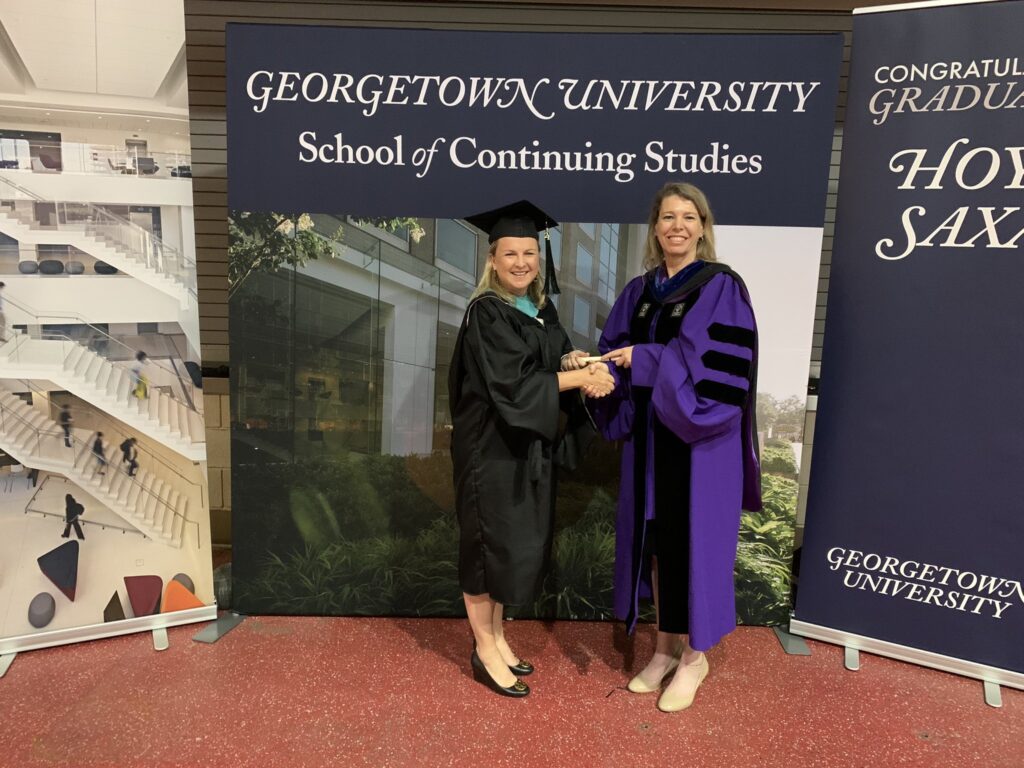Last month, Mission in Motion reflected on an article in the New York Times about the concept of languishing and its relevance to the Ignatian spiritual practice of the Examen of consciousness. The suggested antidote to the “blah” you may be feeling during the pandemic was a regular practice of creating uninterrupted interior space to reflect on moments of consolation, or effortless experiences of deep joy, in your daily life. The Examen, which we practice as an SCS community every Friday at 12 p.m. ET (register for SCS daily digital meditation), is an excellent way to notice the movements of consolation and desolation in your life. A regular habit of naming gratitude, even when gratitude seems difficult to name, ultimately leads to greater generosity, a sense of belonging, and a feeling of purpose. Healthy habits of self-reflection and a deepening awareness of one’s deeper purpose are at the heart of a Georgetown education, enshrined both in the Spirit of Georgetown and Campus Ministry whose mission is to help our community members “lead lives of deeper meaning, belonging, and purpose.”

Having celebrated the 2021 Commencement and now continuing into the summer and more pandemic-related transitions in daily life, I want to focus on another NYT piece about flourishing, the flip side of languishing. Dani Blum’s article, “The Other Side of Languishing Is Flourishing. Here’s How to Get There,” lays out a compelling set of suggestions about how to get closer to flourishing, or what Tyler VanderWeele, director of Harvard’s Human Flourishing Program, calls “what people are ultimately after … it’s living the good life. We usually think about flourishing as living in a state in which all aspects of a person’s life are good – it’s really an all-encompassing notion.”
Grounded in scientific evidence, Blum’s outline of flourishing-inducing activities resonates deeply with the wisdom of Ignatian spirituality. These suggestions include:
- Assess yourself
- Savor and celebrate small things
- Try “Sunday dinner gratitude”
- Do five good deeds
- Look for communities and connection
- Find purpose in everyday routines
- Try something new
Each of these ideas could easily be located within the tradition of Ignatian spirituality or any of the many other spiritual, religious, and humanistic traditions expressed and practiced at Georgetown. I want to focus, in particular, on the notion of “savoring” and celebrating small things as a way to flourishing.
Blum expands upon the idea of savoring by linking it to celebration and the acknowledgment of small moments:
“It’s not just the big occasions that should be marked. Acknowledging small moments is also important for well-being, research shows. Psychologists call it ‘savoring.’ Savoring is about appreciating an event or activity in the moment, sharing tiny victories and noticing the good things around you.”
A practical example of this savoring, according to Blum, is a study of how college students were overall more appreciative after taking five photos of their everyday lives for two weeks and then reflecting on the photos – favorite books, friends, campus experiences – and the small moments that elicited joy in their lives. This invitation to enter into deeper joy by engaging with the everyday data of experience is at the foundation of the Spiritual Exercises, a prayer guide designed by St. Ignatius of Loyola that animates the spirituality of the Jesuits.
Early in the Spiritual Exercises, St. Ignatius invites the retreatant to appreciate the various levels of how human beings encounter and know God in their lives and in the world. Ignatius writes: “For it is not much knowledge but the inner feeling and relish of things that fills and satisfies the soul.” The point Ignatius is making is that through the affections, or emotions, one is able to, according to Michael Ivens, S.J., noted commentator on the Spiritual Exercises, penetrate “beyond the immediately obvious to the ‘inner’ experience of meaning of the person or truth known.” The habit of relishing graces or gifts, fully savoring them both intellectually and emotionally, can help root ourselves in gratitude and protect ourselves against inevitable periods of desolation or languishing. In the small moments of our daily lives, we are invited to comb through, savor, and journey deeper into the mystery of who we are and how God may be at work in your life.
Curious? Here are some suggestions for your journey to greater flourishing:
- Please consider participating in the SCS Daily Digital Meditation offered Monday through Friday at 12 p.m. ET over Zoom (register for SCS daily digital meditation). The final meditation of each week, on Friday, is a guided Examen for 10-15 minutes inviting participants in silence to review their experiences of the past week. Please join us!
- Kindness and service contribute to flourishing. Visit Georgetown’s Center for Social Justice for opportunities to engage in service and a deeper commitment to the common good. Want to learn more about why social justice is a core component of a Jesuit education? Consider registering for the upcoming virtual Justice in Jesuit Higher Education Conference hosted by Georgetown in June (the events take place via Zoom on June 8, 10, 14, 16, 22, and 24).
- Reach out to explore how spiritual practices like the Examen and other forms of prayer and meditation facilitated by the chaplains and staff of Georgetown’s Campus Ministry can help you flourish. Send an email to Jamie Kralovec, SCS Associate Director for Mission Integration, to set up an initial conversation.
